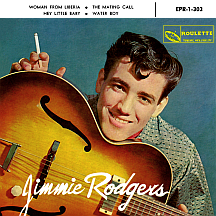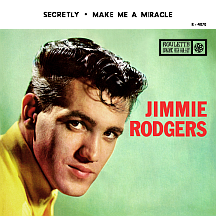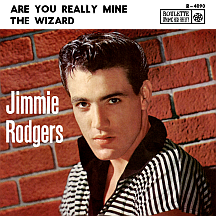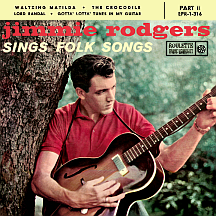JIMMIE RODGERS
Compared to other popular 20th century entertainers, Jimmie Rodgers has faced more than his share of hardship. A major American singing star with a number one hit early in his career, he later hosted his own television series and was, for a time, a household name. Then suddenly his luck changed; he was the victim of the most brutal kind of beating that left him near death, followed by a long, tedious rehabilitation...only to be afflicted later in life by a disorder that made it difficult to speak, much less sing. Yet he remained suprisingly upbeat despite suffering through one daunting physical challenge after another.
He grew up in Camas, Washington, just across the Columbia River from Portland, Oregon, a child like any other but with a fascination for music technique. In 1952, at age 19, he joined the Air Force, just in time to be packed off to Korea during the war that came to an end the following summer. Later he was stationed near Nashville, Tennessee and began singing and playing piano at a small nightspot called the Club Unique. After hearing Bob Merrill's song "Honeycomb" by crooning Philadephian Georgie Shaw (the flip side of his top ten 1954 hit "Till We Two Are One"), Rodgers added it to his repertoire.
Jimmie headed south and made regular appearances at the Keyboard Club in Beverly Hills, primarily the home of jazz musicians. His preference for folk and pop tunes was accepted there and he usually accompanied himself on electric guitar. By 1956 he'd returned home, working in Portland-area clubs; he made his first record for an obscure Vancouver, Washington label, Zig Zag. "I Always Knew" and its flip, "I Won't Sing Rock and Roll," had backing by a local band, Frankie Bell and his Rhythm Kings, and was amateurishly produced (except for Jimmie's appealing vocal delivery). Midwestern piano man Chuck Miller (best known for "The House of Blue Lights") caught his act, then helped him get an audition with his label, Mercury, but it was no go. Jimmie became more aggressive in efforts to get a record deal; in June 1957 he tried out for Roulette, a recently-formed label that had already scored hits with Buddy Knox and Jimmy Bowen. He sang "Honeycomb" for producers Hugo Peretti and Luigi Creatore and, to say the least, they had a strong reaction to it.
Within hours, Hugo and Luigi set up a late night session at Bell Sound with whatever top-notch musicians were available; ('What a darn good life when you got a wife like...') "Honeycomb" was completed and released immediately, before any contracts had been signed. Once the record started climbing the charts in August, they locked him up. By the end of September he sat proudly at number one. No one seemed to confuse his name with the other Jimmie Rodgers, "The Singing Brakeman," who was popular in the late 1920s and early '30s and who died in 1933, a few months before his younger namesake was born. The coming folk explosion hadn't quite kicked in (The Kingston Trio were primed to ignite the spark the following year), so he had to settle for doing borderline-folky pop songs that were produced as such.
"Kisses Sweeter Than Wine," written by Pete Seeger and Lee Hays (using the pseudonyms Paul Campbell and Joe Newman) and recorded by their group The Weavers in 1951, received a brighter Rodgers treatment ('...when I was a young man and never been kissed, I got to thinkin' it over how much I had missed...') and reached the top ten just before the end of the year. Al Hoffman, Dick Manning and Hugo and Luigi (using the name Mark Markwell) concocted the third hit, "Oh-Oh, I'm Falling in Love Again," slightly rotating the topic of the first two ('Got me a wife, she's the light of my life...'), giving Jimmie a trio of consecutive smashes about falling in love and raising a family...something he knew a lot about, since he was already married and had two children before all this record-making business had begun. The flip side of "Uh-Oh" bore little resemblance, as "The Long Hot Summer" (the theme from director Martin Ritt's The Long, Hot Summer starring Paul Newman and Joanne Woodward) featured a full orchestra.
The Hoffman-Manning-Markwell songwriting team showed up on the labels of several Rodgers hits, including the next three. The "happily married with kids" device was dialed back with "Secretly" and the public had no problem accepting a little implied infidelity; it spent most of June and July in the top ten, making its mark as his second biggest hit. Its B side, "Make Me a Miracle," edged closer to his folk inclination, complete with archaic references ('I'm only a cup, make me a chalice...I'm only a hut, make me a palace...'). "Are You Really Mine" dealt simply with romantic yearning and became his fourth top ten hit over a one-year span. "Bimbombey," penned by octuple Oscar nominee Mack David with Hugo and Luigi, told of a mystical, mythical land...or was it just a place in India? Answer: the first option. It peaked at number eleven in December and was the last of his high-charting hits. There were many to come, but none would place him back in the top 20.
Four songs reached the top 40 in 1959. "I'm Never Gonna Tell," "Ring-A-Ling-A-Lario" and "Tucumcari" were catchy, semi-folky songs in the established Rodgers style, while the Lou Stallman-Sid Jacobsen ballad "Wonderful You" tugged at the heartstrings. For six months starting in March of '59 he hosted The Jimmie Rodgers Show, a 30 minute variety series that aired Tuesdays at 8:30PM on NBC. Connie Francis, one of the hottest breakout stars of 1958 and '59, was a regular on the show. Further indulging his sentimental side, Jimmie entered 1960 with "T.L.C. Tender Love and Care," which would be his last top 40 hit for quite some time. Flip "Waltzing Matilda," an Australian folk song dating to the 1890s, coincided with its inclusion (not his version) in On the Beach, director Stanley Kramer's film adaptation of Nevil Shute's best selling novel of apocalyptic devastation. Rodgers turned to movie acting with a role in the 1961 Civil War drama The Little Shepherd of Kingdom Come; three years later he took a second try in a low budget 1964 World War II film, Back Door to Hell, costarring with Jack Nicholson.
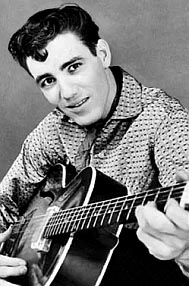
His association with Roulette reached its end in 1962 over a dispute with Morris Levy, the label's owner, an imposing figure notorious for withholding artists' royalty payments (among many transgressions). Rodgers signed with Dot Records, debuting mid-year with a syrupy Fred Rose-Mel Foree song, "No One Will Ever Know." In the fall his recording of the theme for the The Real McCoys, starring Walter Brennan, Richard Crenna and Kathleen Nolan, replaced a previous version and ran over the credits of the show's sixth and final season. There were several minor chart singles during his four year association with Dot (including a pair of Rod McKuen compositions, "Two-Ten, Six-Eighteen" and "The World I Used to Know"). He hosted a syndicated variety series, The Folk World of Jimmie Rodgers, between 1963 and '65.
"Honeycomb" had a life far beyond its initial 1957 run; for about a decade it was used as the jingle for Honeycomb breakfast cereal, launched by General Foods' Post division in 1965. Rodgers recorded new lyrics specifically for the earliest commercials ('Tomorrow morning in your home sweet home, enjoy the eatin' treat called...'), which featured a cartoon character named "The Honeycomb Kid." Almost immediately his voice came clearly through on spots for another new food product, Franco-American SpaghettiOs (with that infectious tune 'Uh-Oh, Spaghetti-Os!,' reminiscent of yet another renowned Rodgers hit). At some point Jimmie's recordings were replaced by unnamed jingle singers.
A self-penned ballad, "It's Over," set him in a timely soft-rock direction and in June 1966 became the elusive top 40 hit he'd sought for six years. He reached that level again 16 months later, after signing with Herb Alpert's A&M Records. The success of "Child of Clay," a rather downbeat Ernie Maresca-Jimmy Curtiss message song, suggested his career was taking a turn for the better. Yet his entire life took a violent about-face on December 20, 1967, when he was pulled over while driving on the San Fernando freeway and beaten with a tire iron (or similar object) by a mysterious assailant with no apparent motive; reports have implied the aggressor was an off-duty policeman, though Jimmie has said he wasn't entirely sure who did it. He suffered extensive head trauma in addition to arm and leg injuries and underwent several operations. Ultimately doctors inserted a steel plate on his scalp that covered most of his head.
Jimmie fought through the pain and physical difficulties caused by the incident and after an extensive period of rehab he resumed performing for audiences. During the 1970s he toured regularly and made a number of welcomed TV appearances. "Froggy's Fable," a variation of a tradition folk song, was a minor hit on Epic in 1972 (he'd done the song in somewhat different form in '58 as "Froggy Went A-Courtin'"). A series of recordings in Nashville for the ScrimShaw label, produced by former Roulette labelmate Jimmy Bowen, landed on the country charts between 1977 and '79; the biggest, a tongue-in-cheek novelty, "A Good Woman Likes to Drink With the Boys," preceded a mildly disco-style version of his 20-year-old hit "Secretly."
In later years a new challenge presented itself: a vocal disorder called spasmodic dysphonia affected Jimmie's ability to speak or sing, derailing his career for a time...again. After considerable effort he gradually regained much of his ability, enabling him to make a limited number of live concert appearances. Despite all the physical hindrances, Jimmie Rodgers has presented himself in a positive light, refusing to buckle under extremely trying circumstances.
NOTABLE SINGLES:
- I Always Knew - 1956
with Frankie Bell and his Rhythm Kings / - I Won't Sing Rock and Roll - 1956
with Frankie Bell and his Rhythm Kings - Honeycomb - 1957
- Kisses Sweeter Than Wine - 1957
- Oh-Oh, I'm Falling in Love Again /
The Long Hot Summer - 1958 - Secretly /
Make Me a Miracle - 1958 - Are You Really Mine /
The Wizard - 1958 - Bimbombey - 1958
- I'm Never Gonna Tell /
Because You're Young - 1959 - Ring-A-Ling-A-Lario /
Wonderful You - 1959 - Tucumcari - 1959
- Wistful Willie - 1959
- T.L.C. Tender Love and Care /
Waltzing Matilda - 1960 - Just a Closer Walk With Thee - 1960
- The Wreck of the "John B" - 1960
- Woman From Liberia - 1960
- When Love is Young - 1961
- A Little Dog Cried - 1961
- No One Will Ever Know - 1962
- Rainbow at Midnight - 1962
- Two-Ten, Six-Eighteen (Doesn't Anybody Know My Name) - 1963
- The World I Used to Know - 1964
- It's Over - 1966
- I'll Say Goodbye - 1967
- Child of Clay - 1967
- Today - 1968
- Froggy's Fable - 1972
- A Good Woman Likes to Drink With the Boys - 1977
- Secretly - 1978


